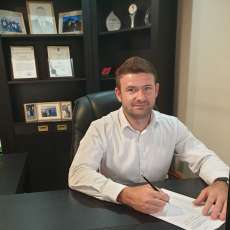Green Seiro was founded in 2013 and offers a full range of equipment and services for the installation of photovoltaic panels. Their capabilities range from residential consumers to the development of photovoltaic parks.
Can you please walk us through the creation of Green Seiro and your vision for the company?
I have always felt attracted by the idea of running my own business. The choice of renewable energy was inspired by a friend who worked in this sector, both in Romania and Germany, who was persuasive in explaining the importance of this sector for the future. I was very young at the time, with no previous experience in business, so I went through a very steep learning curve regarding all aspects of how a business is run, from who to talk to, what needs to be done and how, and what are the best ways to create visibility for my brand. Renewables turned out to be a good bet, the company has been growing steadily and at present we are able to offer a full range of equipment and services for the implementation of solar systems, both for residential use and photovoltaic parks.
How is the business segmented at present and where are you noticing demand stemming from?
About 95% of our business currently comes from the residential sector. We have developed excellent capabilities in this area and this is well reflected in our numbers - between 2017 and 2018, we have increased our revenue by 400%. This growth was fuelled by our team of well educated engineers and electricians, as well as the fact that we focus exclusively on photovoltaic systems, which allowed us to develop in-depth expertise and bring forth very high quality work.
From the early days, however, I was keen to develop more complex capabilities within the company, that would allow us to build photovoltaic parks. We are still working on expanding this side of the business but the legislation in Romania has made it rather difficult to progress. In 2013, when Green Seiro was founded, we were involved in only one such transaction, which involved intermediation work, namely we moved the structure of a park from an Italian producer to Bruiu, a commune located in Sibiu county. We developed a small park in Romania in December last year, and at the moment we are working on a park in Poland. Other than this, we relied on residential installations and I participated hands on in the projects in order to be able to support this new venture and ensure high quality standards.
What do you mean more specifically when you say legislation in Romania made it difficult to progress?
I am mainly referring to the law concerning green certificates, the state aid scheme that was implemented in Romania. Before 2013, one MWh was the equivalent of six green certificates, whereas today the producer only receives three. Many assets have been sold following this change, and presently we do not have a real market for photovoltaic parks. The key reason for this is that it is not possible yet to recover the investment solely based on energy sales, especially since there are additional costs that accumulate. For instance, in order to sell energy you need a producer certificate and if you want to use the distributors network you need to pay a network tariff that amounts to hundreds of thousands of euro. It is possible to make some profit now that the technology prices are lower, but we are still talking about rather low margins, which do not justify the investment costs.
Generally speaking the situation in the market is still unsettled, and further to the legislative aspect there are people that still have no clue what a photovoltaic system is. The concept is still new to the Romanian market, and for this reason we are investing in educating firstly our team (myself included) through various training courses, and we also contribute to educating the public at large. For example, we work with local and regional media outlets and develop articles that explain what a solar panel is, what maintenance entails, how the warranty can be used and so on. More than anything people want to know how much it will cost them, so we made sure to include this topic as well in the articles that were published and give people a better sense of the investment required and long term financial benefits.
What is your assessment regarding the national program for installation of photovoltaic panels?
There are obvious strengths to it, such as the fact that it creates awareness across the country about solar panels, and generally the field of clean energy. It is also positive in the sense that it will bring us closer to meeting EU targets regarding renewable energy. But there are some flaws to it as well, the most concerning for us being the timelines that keep getting postponed and also the financial aspect. The companies responsible for installing photovoltaic panels, like ourselves, must first make the entire investment themselves and only after that they will be able to recover the money from the state. This is very problematic, it is difficult to take on such costs for multiple customers and wait 8 months in order to recover it from the state. No suppliers will give you such long payment terms, so this set up is far from ideal.
What can we look forward to from Green Seiro in the next two to three years?
Our goal is to double our turnover in the coming year, a slower growth compared to last year but one that we see as stable and achievable. We are well rooted in the residential sector already so our focus will be on expanding the photovoltaic parks side of business. Ideally we would like the business to be split 50/50 between the two segments.
This will bring on new challenges and we will need to acquire a new set of knowledge, but it will also open the door to new opportunities internationally. As mentioned we are already working on a park in Poland and we are in discussions about new work in Hungary and the Netherlands. Everything going according to plan, there is tremendous potential to expand in other parts of the world as well.






